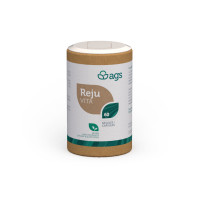
Reju'vita
101.86 USD
Reju'vita; is the only food supplement on the world market that combines PQQ with its direct cofactors (CoQ10, alpha-lipoic acid, NADH and astaxanthin) to multiply its ultra-beneficial effects on the metabolism of mitochondria!
Box contains 60 capsules
Reju'vita
101.86 USD
Reju'vita; is the only food supplement on the world market that combines PQQ with its direct cofactors (CoQ10, alpha-lipoic acid, NADH and astaxanthin) to multiply its ultra-beneficial effects on the metabolism of mitochondria!
Indications
Origin: Asia / Europe
Recommended dosage
2 capsules per day during meals containing good fats or as advised by your healthcare professional.
Contraindications
This dietary supplement should be consumed by adults only, excluding pregnant and breastfeeding women.
Guaranteed without
• Gluten free • Lactose free • Without Conservative agent • Without colouring
Precautions for use
Food supplements are not a substitute for a varied and balanced diet or a healthy lifestyle. Keep out of the reach of children. Do not exceed the recommended daily dose.
Conservation
Store in a dark, dry place at a temperature between 15 and 25 ° C.
Composition
2 gélules: Acide-R-alpha-lipoïque / R-alfa-liponzuur 300 mg Co-enzyme Q10 - LEO HB / Co-enzym Q10 LEO HB 166 mg MGCPQQ® (pyrroquinoléine-quinone) 20 mg NADH 20 mg SOD B Extramel® 25mg
Excipients
No
Ingredients
Acide-R-alpha-lipoïque, gélule : pullulane, Co-enzyme Q10 LEO HB, MGCPQQ® (sel disodique de pyrroquinoléine-quinone) , nicotinamide adénine dinucléotide (NADH), SOD B Extramel®.
Customer reviews
There are no reviews yet for this product
We use cookies to provide the services and features offered on our site and to improve the experience of our users.
You can accept or refuse all or part of the cookies placed by AGS. You can change your mind at any time by setting your cookie preferences.
To modify your preferences later, click on the « Cookie Preferences » link located at the bottom of the site.
What are these cookies used for?
Google: Audience measurement,
Facebook: Personalized advertising.